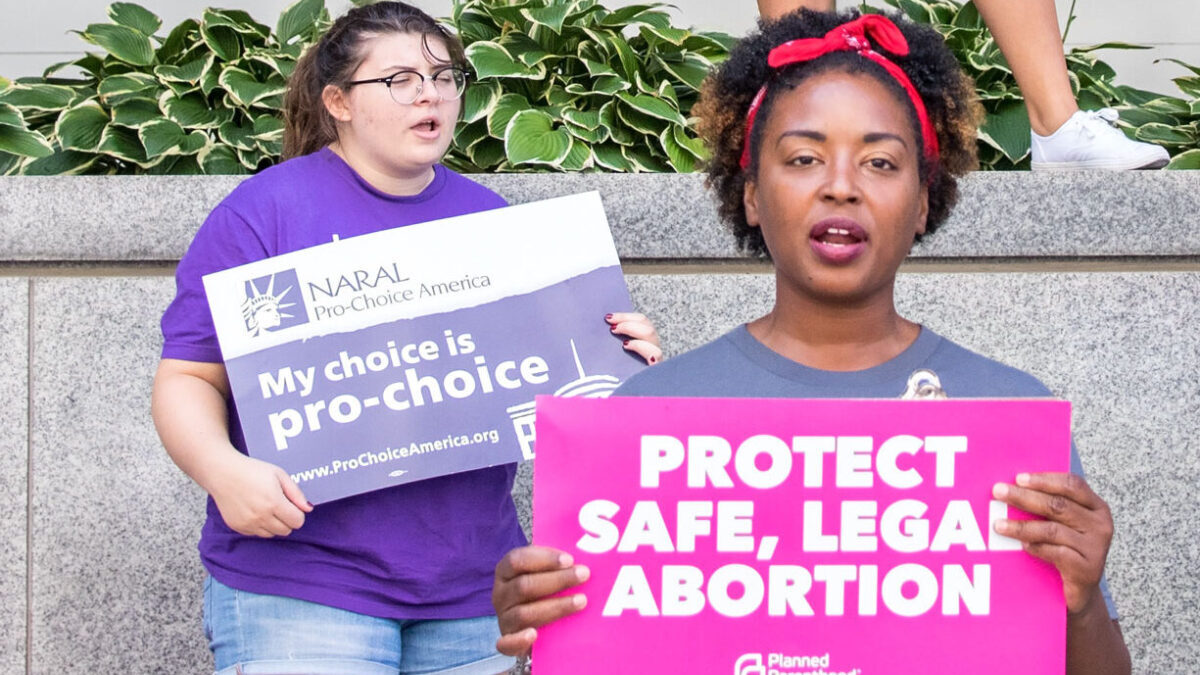On Nov. 7 in Ohio, the passage of Issue 1 dealt the pro-life movement another stunning defeat in a long string of statewide losses since Roe v. Wade was overturned.
It would be too easy for politicians and pundits on the left, and even some on the right, to jump on the “Being pro-life is political suicide” bandwagon and integrate that notion immediately into a long-term strategy to shape our American political life. We have already seen this in the days following Nov. 7.
But before we write the obituary of the “all life is sacred” mantra, it would be wise to consider why we lost in Ohio.
The Truth Was Blocked
We lost because the levers of power (the donor class, the media, and the ideological medical establishment) blocked the truth about Issue 1 at every turn, despite our best efforts. Somewhere near $50 million (most of it from out-of-state groups) was spent on pro-abortion advertisements, almost twice as much as the pro-life side.
Media outlets now refuse to use the word “heartbeat” anymore as applied to a preborn baby. They consistently alter public perception with phrases like “abortion care,” and they refused to “fact check” the glaring untruths about the ballot initiative.
A thousand doctors ignored the science of fetal medicine completely to claim a “pregnant person’s” (note: not “woman’s”) reproductive choices such as contraception, miscarriage, and ectopic pregnancy treatment were at stake (which they never were). Pro-life doctors in Ohio were doxxed, silenced, and harassed for their defense of human life.
We lost because we were outspent, and money can create and propagate purposeful inaccuracies and sow confusion. The majority of Ohioans do not want abortion to be legal up to the ninth month on the say-so of an abortionist’s judgment of the “individual’s health”; Ohioans do want parents to know when their own children make life-altering reproductive decisions.
Wednesday-morning quarterbacks will also say we lost because Ohio’s six-week ban on abortion (the Heartbeat Law), which allowed no exceptions for rape or incest, was “too extreme.” But rape and incest exceptions are not actually “exceptions” — these are human persons. No politician effectively made this point, or even tried to. So it is not “extreme” to hold fast to principles of science and medical ethics when pro-lifers say that the manner in which one is conceived does not eliminate one’s humanity or right to be born.
We lost because Ohio is one of fewer than a dozen states that allow a state constitution to be altered by a simple majority vote on a ballot amendment. Voters rejected a change in August that would have raised that threshold. States facing similar measures must look to their own constitutions and protect them as the first step against their mutilation by outside interests.
Pro-Lifers Need to Win the Narrative
We also lost because narrative wins in a post-rational age. People are moved not by science (which clearly shows the unborn child is not a “blob” and is a genetically distinct individual), nor by argument (when cancel culture or algorithms forbid it). Instead, people are moved by stories. And in Ohio, we pro-lifers did not tell our stories enough, or — for lack of money and insight — did not have the opportunity to do so, before it was too late.
There are women who have suffered immensely after abortion. Other mothers have given birth to babies on the cusp of viability who have survived and thrived. Were they only persons because their mother (and doctor) wanted them to be so? There are human beings who were conceived from rape. We should have told their stories and then seen if anyone says they still don’t count.
Such narratives would expose the real extremism: that there should be no limits to abortion; that the viability standard goes too far, as does only allowing abortion before the unborn feel pain; that asking for parental consent to a minor’s abortion is a violation of some fictious human right.
Finally, we lost in Ohio because we did not have an alternative to give the voters — and voters, when faced with a perceived binary choice, an “all or nothing,” chose one side. A state that wants to stay pro-life must give its citizens an alternative vision: a political, economic, and social culture that embraces human life from before the cradle to the grave and lays the groundwork to ensure abortion is never necessary.
Lessons Learned
For those worried that such abortion extremism is coming to their states, take heed of these lessons from Ohio. Fundraise now. Build, through legislation and moral action, a humane culture that supports pregnant women, mothers, and babies and punishes violence against women. Message early the truth that women’s lives will not be at stake with reasonable restrictions on abortion. Protect your state constitution from parasitic outside influences. Allow health care practitioners and crisis pregnancy centers to bear witness to the goodness of human life, free from harassment by the medical and legal establishment. And tell the pro-life stories of regular folks who experienced the life-altering joy and goodness in choosing life.
Pro-life people around the country must learn both from Ohio’s failures and our triumphs. And in our heartbreaking loss, the pro-life movement did some things remarkably well, which other pro-life states should model. First, we organized and united the fractured grassroots activist groups and held this fragile coalition together until the end. This is no small feat and is an investment for the future. States anticipating future ballot initiatives must unite all these pro-life forces together, putting aside egos, financial interests, and all vainglory for a cause that is too right and just to fail.
Second, the Catholic Church in our state mobilized, donated millions, and “walked the walk” to attempt to defeat this amendment. While some may claim this money is now wasted in defeat, it has lit a fire in the hearts of the faithful and shown moral courage that will not be forgotten. Continuing to push the idea that human beings are not just random material “choices” here by accident but are transcendent creatures of God with unassailable value is a crucial message the churches continued to voice, against all odds.
Third, even in the wake of this defeat, the thought leaders and grassroots movement have doubled down on the principles for which we fought, while being practical about what can be achieved going forward. It has awakened us both to the callous nature of the culture and to our own creativity to imagine ways in which we will move forward. Far from cowing us, this defeat will broaden our efforts to create a truly pro-life society in which abortion is not seen as necessary or proper “medical care,” but an aberration.
How to Continue the Fight
So how do you continue to fight for something you know is right, even if conventional wisdom says it risks electoral disaster? You play the long game. Like the board game Risk, you may conquer Asia in one turn, but you will not be able to hold it. The pro-life movement in a number of states suffered from precisely this misplaced enthusiasm in the wake of the Dobbs v. Jackson Women’s Health Organization ruling. We now need to look for, and create, sustainable gains that can be fortified until our time arrives again.
But of course, even reasonable limits on abortion will be anathema to abortion activists. They want it all. You cannot placate those ravenous for power when they think they have won. The Ohioans who were fooled into thinking Issue 1 was “reasonable” are about to reap the whirlwind, unless we have the courage to fight on, change hearts, and persevere. The truly wonderful thing about being pro-life is, once you are convicted of it, there is no going back, no matter what the political climate appears to be. So we fight on and move forward.
We lost in Ohio, but we are not losers. We were on the wrong side of the vote, but not on the wrong side of history. The road ahead will be full of tragic and painful compromises that may risk the lives of some unborn children while trying to protect as many of the others as we can. This is a suffering those who believe in the dignity of all unborn human life may have to accept (for now).
But our aspirations remain, not for ourselves, but for women and the unborn whom we love and serve; one day this disheartening defeat will be seen as a turning point in making our political, economic, social, and medical culture worthy of the name “pro-life.” As Mother Teresa of Calcutta said so beautifully and hopefully, “Yesterday is gone. Tomorrow has not yet come. We have only today. Let us begin.”









